Gimme Some Truth: The LennonOno Grant for Peace in its Second Year
For a second year, artist / activist Yoko Ono voices her desire for change in the Middle East through the LennonOno Peace Prize. Israeli artist Zvi Goldstein and Palestinian artist Khalil Rabah were the inaugural recipients of the prize in 2003 when each received a $50,000 grant, supporting Ono’s belief that artwork furthers cultural understanding and lays the groundwork for peace. But in the wake of an intensely violent year and a war that has claimed over 1,000 American and some 14,000 Iraqi civilian lives, Ms. Ono has awarded the 2004 prize to non-artists. The first honoree is investigative journalist Seymour Hersh, who received the prize in recognition of his reporting on the Abu Ghraib prison abuse scandal for the New Yorker magazine. Ono awarded the second grant to Israeli Nuclear whistle-blower Mordechai Vanunu, who exposed Israel’s policy of stockpiling nuclear weapons.
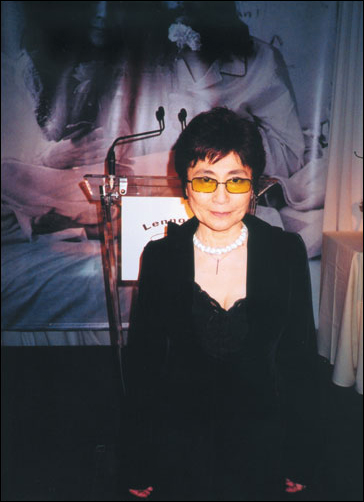
Dark Secrets
By way of her choices, Ms. Ono affirms the need for integrity and transparency on the part of democratic governments even during wartime. Ono’s first honoree, Seymour Hersh, has been calling the government to account for its actions since the sixties when he broke the story of the My Lai massacre in Vietnam and its subsequent cover-up. The dark days of the Nixon presidency (tricky Dick of John Lennon’s “Gimme Some Truth”) have returned with a vengeance. While Bush and Nixon share a dangerous hubris, Hersh believes that Bush is motivated by the sincere, deep-rooted conviction that he is doing the right thing. During a recent talk at Berkeley, Hersh stated that Bush, Dick Cheney, Paul Wolfowitz, and the other neocons are, “idealists, you could call them utopians.”
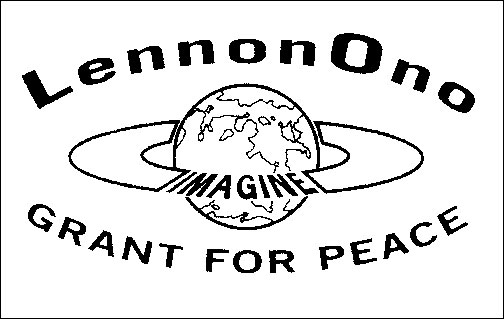
At the LennonOno Grant awards ceremony, Hersh described a call that he received from a first lieutenant who was in command of a unit between Baghdad and the Syrian border. His unit was stationed in an agricultural area, and the men hired 30 local Iraqis to guard a granary. Over several weeks the lieutenant and his men became friendly with these guards. Then orders came from Baghdad for the village to be cleared and another platoon from the lieutenant’s company arrived and summarily shot all the granary guards. Men from his unit, along with the villagers, were outraged. The lieutenant demanded an explanation from the captain who said, in his own defense, “No, you don’t understand, that’s a kill. We got 36 insurgents. Don’t you read those stories when the Americans say we had a combat maneuver and 15 insurgents were killed?” Hersh stressed the similarity of this war to Vietnam with its body counts. In response to the lieutenant, Hersh said, “Fella, you blamed the captain, he knows you think he committed murder, your troops know that their fellow soldiers committed murder. Shut up. Complete your tour. Just shut up! You’re going to get a bullet in the back.’ And that’s where we are in this war.”
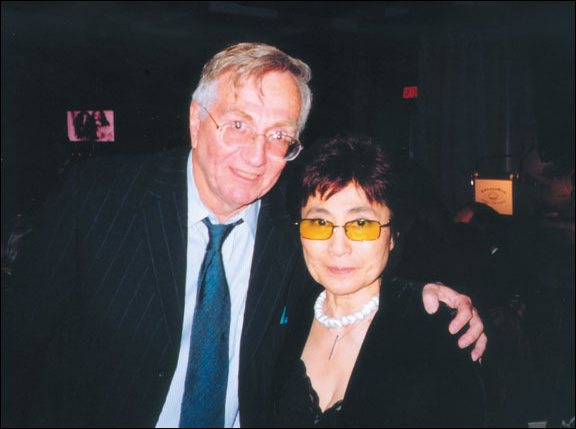
Ono’s second honoree is Mordechai Vanunu, a Morrocan-born Jew who emigrated to Israel with his family in 1963. After serving in the Israeli military, Vanunu got a job working at the Dimona Nuclear Research Center in the Negev Desert, near his home in Beersheba. The center actually housed a secret, underground plutonium separation plant, and Vanunu realized that his work was contributing to Israel’s nuclear weapon program. Before leaving his employment at Dimona, Mordechai took numerous photographs of the facility. Vanunu subsequently left Israel, traveled throughout Asia, and ultimately arrived in Sydney Australia where he converted to Christianity and was baptized in the Anglican faith.
A reporter from the London Sunday Times got wind of Vanunu’s story and sent a reporter to Sydney to get more information. The Times then flew Vanunu to London where his story was corroborated by British nuclear experts and the newspaper ran its story in October 1986. Israel had previously adhered to a policy of strategic ambiguity with regard to nuclear weapons, refraining from affirmations and denials. The Vanunu article paints Israel as a major nuclear weapons power with an arsenal of as many as 200 advanced nuclear warheads.
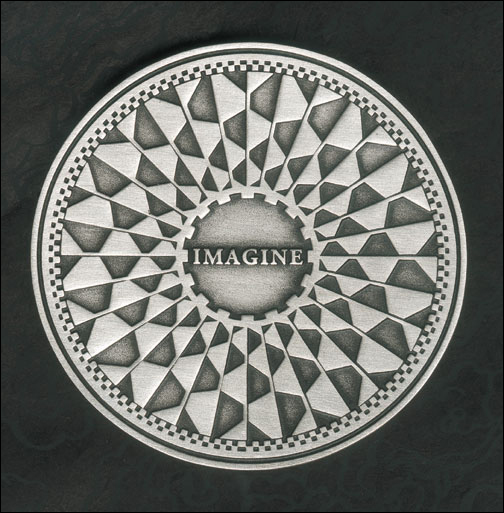
Prior to the publication of Vanunu’s story, the whistle-blower was kidnapped by Israeli agents and flown to Tel Aviv where he stood trial for espionage and treason. He was imprisoned and served the first 11 1/2 years in near solitary confinement, softened by occasional visits from guards, his siblings, his lawyer, and a priest. In 1998 he was allowed contact with some other prisoners and granted visits from Nicholas and Mary Eoloff, an American couple from Saint Paul, Minnesota, who had adopted him a year earlier. Vanunu was released from prison in April 2004 but is still subject to restrictions. He is not permitted to leave Israel, so the Eoloffs accepted the LennonOno Grant for Peace on his behalf.
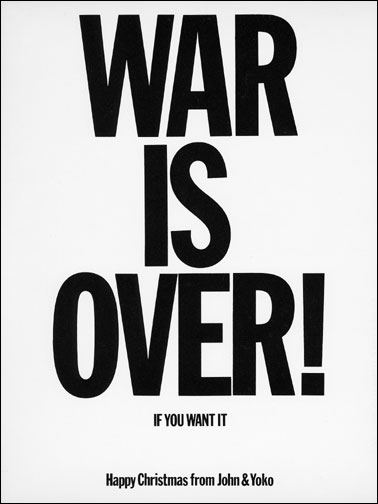
At first, I was troubled by Ono’s choice of Vanunu as one of the grant recipients. I understand that Israel has been surrounded by enemies since her inception, and wish to see her protected from any form of attack. Yet Ono, unlike most Americans, was directly touched by the suffering of Japanese civilians in the aftermath of America’s atomic bombings of Hiroshima and Nagasaki. Nuclear war is unthinkable in humanistic terms, and nuclear stockpiling is a problem that transcends politics. Unfortunately, we Americans have been among the worst culprits when it comes to nuclear stockpiling. Eleven nuclear bombs were lost by the American military during the Cold War, and sappers are still looking for a hydrogen bomb that was jettisoned off the coast of Georgia in the late 50s. The problem is by no means specific to Israel and regards the danger of hoarding nuclear weapons in the United States, Russia, the United Kingdom, France, China, India, and Pakistan.
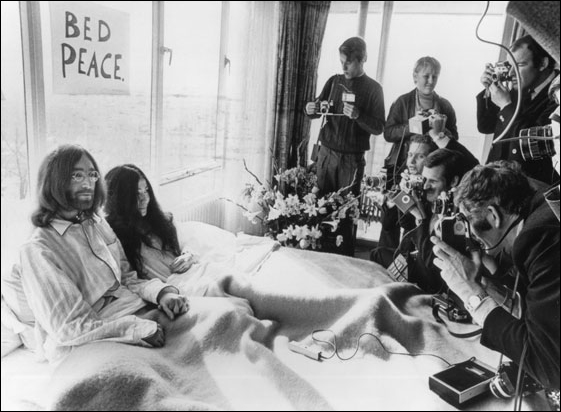
President Bush insists that we are living in dangerous times. Yoko Ono by way of the LennonOno Grant for Peace, illuminates human rights abuses and cover-ups that pose a more insidious danger to democratic societies than terrorism. In a democracy, people have the basic right to know what their leaders are up to, and what acts are being committed in their name. Rule of law must prevail in the treatment of prisoners of war and Israeli citizens need to be privy to decision making with regard to nuclear policy. Ms. Ono described the 2004 recipients as “people who have spoken out for the benefit of the human race by overcoming extreme personal difficulties and, in doing so, have allowed the truth to prevail.” Dissenters like Hersh and Vanunu force the public to confront uncomfortable issues and take a position, debunking the fraudulent secrecy of politicians and shaping policy.
© 2004 Daniel Rothbart. All rights reserved.